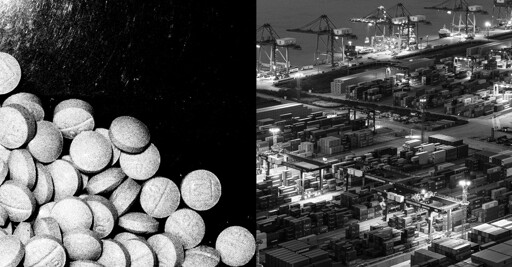The United States won’t be able to solve the fentanyl crisis without help from its greatest rival. China is the world’s largest supplier of the chemicals that drug smugglers use to produce the opioid, and the country’s regulators have proved that they can stem its spread on the black market—when they’re so inclined. But despite pressure from Washington, Chinese leaders have not done nearly as much as they could to crack down on the illicit-fentanyl trade. For Beijing, the opioid that kills tens of thousands of Americans every year is a source of political leverage that it won’t easily give up.
Chinese officials still decry the opium crisis that foreign traders seeded two centuries ago. The country’s long memory informs the regime’s regulation of domestic drug dealing and use, which it polices and prosecutes severely. But Beijing denies its role in the drug trade beyond its borders. As a spokesperson for the foreign ministry said in May, “Fentanyl is the U.S.’s problem, not China’s.”
Now President Donald Trump is making a renewed effort to hold China accountable. Earlier this year, he imposed tariffs in retaliation for the country’s refusal to act firmly to rein in the trade. At least for now, Beijing appears willing to strengthen controls. In late June, regulators announced new restrictions on two chemicals used in fentanyl production. But China’s record of cooperation has been erratic, fluctuating from moment to moment depending on the state of U.S.-China relations. And any further assistance likely won’t come cheap. Chinese leaders are well aware that fentanyl is a bigger problem for the United States than it is for China. Before entering any new agreement, they will withhold “cooperation as a piece of leverage” until they can extract “certain guarantees or the right price,” Amanda Hsiao, a director in the China practice at the political-risk consultancy Eurasia Group, told me.
In his first term, Trump had some success with getting Beijing to acquiesce. At the start of the fentanyl crisis, more than a decade ago, China was a major source of the finished drug entering the American black market. Then, in 2018, Trump imposed his first round of tariffs and threatened future ones, which probably influenced China’s decision the following year to restrict the production and export of fentanyl. The step effectively eradicated the import of Chinese-made fentanyl into the U.S., and showed that Beijing can suppress the illicit trade when it wants to.
[Sam Quinones: America’s approach to addiction has gone off the rails]
After the restrictions were in place, however, China’s criminal networks switched to shipping out precursors—the chemicals needed to make the opioid—instead of finished fentanyl. They sell the precursors to Mexican cartels, which mix them and smuggle the resulting fentanyl into America. Some of the Chinese syndicates are considerate enough to provide the recipe.
During Joe Biden’s presidency, as U.S.-China relations deteriorated, Beijing allowed the precursor trade to go largely unchecked. Nancy Pelosi, then House speaker, visited Taiwan over Beijing’s objections in 2022, which led Chinese leaders to refuse even discussing fentanyl with Washington. The next year, Biden ramped up pressure by adding China to an official list of the world’s most egregious purveyors of illicit drugs. In an apparent effort to reduce tensions, Beijing resumed talks with Washington on the issue, and last year the regime imposed restrictions on some fentanyl precursors. These steps may have contributed to the decline in fentanyl deaths in America since 2023.
Still, ensuring that China enforces its latest fentanyl restrictions will be no easy task for Washington. Beijing never received the benefits it had expected after previous cooperation, such as tariff relief, so it will likely demand concessions from Washington before provisioning any more help. “China in general extends law-enforcement cooperation to countries with whom it wants to have positive relations and denies it to countries with whom its relations have deteriorated,” Vanda Felbab-Brown, a senior fellow at the Brookings Institution who has studied the fentanyl issue, told me. “This is not China’s policy just toward the U.S., but it’s systematic policy.”
China’s intransigence has led some in Washington to suggest that Beijing might be trying to destabilize American society. “They could stop it if they wanted to,” Secretary of State Marco Rubio said in February. “You have to wonder in some cases, is this a deliberate thing, like are they flooding us with fentanyl?”
That accusation probably goes too far, but China certainly has levers to regulate fentanyl that it’s refusing to pull. Eliminating the trade would be extremely difficult: China’s chemical-manufacturing sector is massive, and smugglers need only tiny amounts of precursors. Still, Beijing doesn’t require local chemical manufacturers to verify the identities of their customers, which would help prevent precursors from falling into the hands of cartels. Nor have Chinese authorities aggressively prosecuted the traders who sell the precursors to illicit-drug networks.
[Listen: The drug that could help end the opioid epidemic]
If “China wanted to be perceived as a compassionate, caring global patron, they would be doing more about this, and they’re not,” David Luckey, a senior researcher at the Rand Corporation who specializes in the opioid trade, told me.
From one standpoint, China’s actions are easy to understand. Its leadership is behaving as many other rational state actors would—exploiting the power it possesses over a strategic competitor. But the grisly truth is that, in this case, China’s power derives from mass death. Chinese leaders continue to use American lives to forward their political aims, rather than taking the small steps necessary to save them. That choice is one of the starkest demonstrations that the regime’s priority of narrow self-interest over the global good won’t be changing anytime soon.
From The Atlantic via this RSS feed


